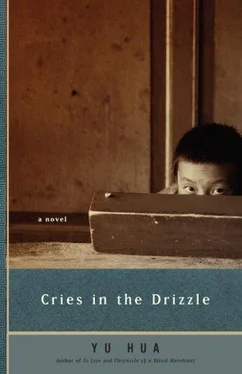Sun Guangping had gone to town that day, and when he came home he found his mother hunched up on the doorsill, tears streaming down her face, muttering to herself, “Such a sin!” The next thing he saw was Yinghua perched on the edge of the bed, sobbing, her hair in disarray.
Sun Guangping did not need to be told what had happened. As the blood drained from his face, he marched into the kitchen and emerged with an ax glinting in his hand. He walked over to where Yinghua was weeping and said to her, “You're going to have to look after Ma and the boy.”
When the meaning of this sank in, Yinghua burst out into wails of anguish. She clutched at his jacket and said, “No, don't! Don't do that!”
My mother threw herself on her knees in the doorway, stretching out both arms in an effort to block his way. Eyes wet with tears, she said gravely to Sun Guangping in a hoarse, wavering voice: “If you kill him, it's you who'll suffer.”
Her expression brought tears to his eyes. “Get up!” he shouted. “If I don't kill him, how can I ever show my face in the village again?”
My mother remained stubbornly on her knees and tried a different tack: “Think of your little boy. It's not worth it, going that far.”
He gave a bitter smile and said to her, “I can't think of any other way out of this.”
The outrage suffered by Yinghua made Sun Guangping feel that he had to have it out with Sun Kwangtsai once and for all. For years now he had been putting up with the losses of face that his father had inflicted upon him, but Sun Kwangtsai's latest affront had forced them, he knew, into a collision course. In his rage he saw with total clarity that if he failed to take a stand it would be impossible to hold his head up among the neighbors.
Everyone in the village was milling around outside that afternoon. In the dazzling sunlight and the glowing eyes of the spectators, Sun Guangping recovered the bravado he had exhibitedas a fourteen-year-old. Ax in hand, he strode toward my father.
Sun Kwangtsai was standing under a tree in front of the widows house, and he watched, perplexed, as Sun Guangping approached. My brother heard him say to the widow, “Can this joker really be out to kill me?”
Then he shouted at Sun Guangping, “Son, I'm your dad!”
Sun Guangping maintained a grim silence and a look of determination. As he came ever closer, a note of alarm crept into Sun Kwangtsai s voice. “You've got only one dad. If you kill him, that's it.”
By this time Sun Guangping was almost upon him, and Sun Kwangtsai could only mutter in panic, “He really does want to kill me!” So saying, he took to his heels, crying out to nobody in particular, “Help!”
A hush fell as my father, now in his sixties, set off on a run for his life. He grew increasingly exhausted as he ran along the narrow road into town, with Sun Guangping, brandishing the ax, hot on his tail. Sun Kwangtsai gave incessant cries for help, but his voice sounded so different from normal that Old Luo, standing at the entrance to the village, asked other onlookers, “Is that Sun Kwangtsai yelling?”
It was quite an achievement for my father to maintain such a blistering pace at his age. But he slipped and fell as he was crossing the bridge, and ended up sitting down there and bursting into tears, crying as lustily as a newborn babe. This was the shocking sight that greeted Sun Guangping when he reached the bridge. Tears had made my father's face as gaudy as a butterfly, and snot dribbled down his lips. He cut such a sorry figure that my brother suddenly felt that chopping his head off made no sense at all. Usually so decisive, for once he was rendered irresolute. But with the throng of villagers around him he knew he had little choice but to put the ax to use. I am not sure what led him to pick my father's left ear, but there in the afternoon glare he grabbed hold of this appendage and lopped it off as cleanly as one might snip through a bolt of cloth. My father's blood spilled out and within a few seconds it encircled his neck like a crimson kerchief. Sun Kwangtsai was so immersed in his own loud weeping that he did not realize the nature of his injury. Only when he grew alarmed by how many tears he seemed to be shedding and stretched out a hand to wipe his face did he see his own blood. He gave a cry of horror and fainted.
As my brother walked home that afternoon, his body was rent with shivers. On this sultry summer day he clutched his arms as tightly as if he was exposed to subzero temperatures. When he threaded his way through the crowd of villagers, they could clearly hear his teeth chatter. My mother and Yinghua blanched as they watched him approach, and both women saw black spots in front of their eyes, as though a horde of locusts was descending. Sun Guangping smiled faintly and went inside. He rummaged through the storage cabinets, looking for his padded jacket. By the time Mother and Yinghua were back in the house, he had already put it on. He was sitting on the bed, his face streaming with perspiration, while the rest of his body continued to shake uncontrollably.
A fortnight later, Sun Kwangtsai, his head swathed in bandages, had a scribe in town write a letter and send it to me in Beijing. This missive, along with much flattery and many endearments, emphasized his role in rearing me and closed with an injunction to seek redress on his behalf from the top officials in Zhongnanhai. The absurdity of this idea left a deep impression on me.
In fact, when my father wrote to me, Sun Guangping had already been arrested. As he was taken away, my mother tugged at Yinghua and blocked the policemen's path. She burst into tears and cried out to them, “Take us instead! Two of us for one of him — isn't that a better deal?”
Sun Guangping served two years, and by the time he came home Mother was already ailing. On the day of his release, Mother stood at the entrance to the village with five-year-old Sun Xiaoming. When she saw Sun Guangping and Yinghua walking toward her, all of a sudden she spat blood and fell to the ground.
After this, Mother's condition deteriorated and she tended to wobble as she walked. Sun Guangping wanted to take her to the hospital for treatment but she flatly refused, saying, “I am going to die anyway. The money's not worth spending.”
When Sun Guangping insisted on carrying her into town piggyback, Mother wept tears of rage and pounded his back with her fists, saying, “I'll hate you till the day I die!”
But Mother calmed down after they had crossed the wooden bridge, and as she clung to Sun Guangping's shoulders a girlish, bashful look began to appear on her face.
Mother died shortly before the Spring Festival that year. One winter evening she began to cough blood, and once it started, it wouldn't stop. When she first felt her mouth fill with blood, she did not spit it out, unwilling to soil the floor and give Sun Guangping more work. Though normally unable to rise from her bed unassisted, Mother still managed to get up and grope around in the darkness for a basin to set next to her bed.
The following morning, when Sun Guangping came into her room, he noticed that Mother's head was drooping over the side of the bed and that dark red blood had accumulated in the basin, leaving the sheets untouched. When he wrote to me later, he said the air outside was thick with driving snow. Her breath reduced to the merest wisp, Mother spent the last day of her life in bitter cold. Yinghua held vigil at her bedside the whole time, and Mothers expression as death grew near seemed peaceful and serene. But in the evening, this woman, hitherto so taciturn, began to rave with startling vigor. Sun Kwangtsai was the target of all her expostulations. Although she had not offered the slightest protest when he was shifting our household property into the widow's possession, her deathbed rants revealed that she had taken these losses very much to heart. In her final moments she cried over and over again, “Don't take the chamber pot away, I need it!” Or, “Give me that basin back!” She listed every one of the items that he had filched.
Читать дальше












